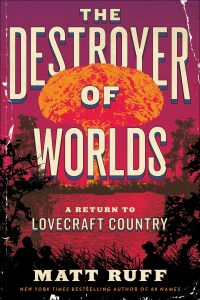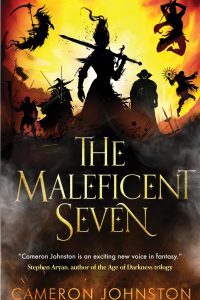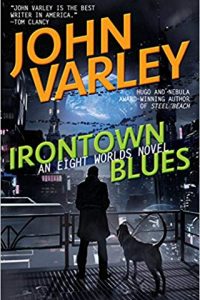Ian Mond Reviews The Destroyer of Worlds: A Return to Lovecraft Country by Matt Ruff
 The Destroyer of Worlds: A Return to Lovecraft Country, Matt Ruff (Harper 978-0-06-325689-7, $30.00, 320pp, hc) February 2023.
The Destroyer of Worlds: A Return to Lovecraft Country, Matt Ruff (Harper 978-0-06-325689-7, $30.00, 320pp, hc) February 2023.
As many readers of Locus will know, Maureen Kincaid Speller passed away on September 18, 2022. She was an outstanding critic (a collection of her reviews and essays, edited by Nina Allan, will be out from Luna Press in 2023) and a generous and insightful editor for Strange Horizons. Maureen was one of the first people to see potential in my criticism, and back in 2016, she commissioned me to write a review of Matt Ruff’s Lovecraft Country for Strange Horizons (still one of my best bits of writing, due in large part to Maureen’s patient feedback). It’s fitting, then, to dedicate my review of The Destroyer of Worlds, the sequel to Lovecraft Country, in Maureen’s memory.
I found Matt Ruff’s Lovecraft Country to be such a complete reading experience – I ranked it as my favourite book of 2016 – that I wasn’t expecting a follow-up. On reflection, though, it makes perfect sense given (a) the critical acclaim the novel received, (b) the fact it was adapted for TV by HBO and (c) the richness of the worldbuilding and the characters. Thankfully, Matt Ruff thinks the same with The Destroyer of Worlds: A Return to Lovecraft Country the first of several planned volumes that will continue the uncanny, thrilling, and oh-so-dangerous adventures of the Turner and Berry families.
Unlike Lovecraft Country, which is composed of a series of linked novellas and novelettes like the ‘‘fix-up’’ novels of years gone by, The Destroyer of Worlds is more conventional in structure. We open with a Prologue – ‘‘The Last Temptation of Simon Swincegood’’ – detailing the titular hero’s dramatic escape from enslavement assisted by the elderly midwife, Hecuba, who claims her soul has ‘‘been to the North many times… and to the future, and the lands of the dead, and to other stranger places.’’ Skip a century, and we’re re-introduced to army veteran Atticus Turner and his cantankerous father, Montrose. It’s been three years since they survived an apocalyptic brush with the powerful Titus Braithwaite and his ‘‘white sorcerer’s cabal’’ in the creepy woods of Massachusetts. Now, father and son are headed to the Swincegood plantation in North Carolina to ‘‘mark the centennial of their ancestor’s escape’’ unaware of the dangers that await them. In parallel, and also rushing headlong into jeopardy, is Atticus’s aunty, Hippolyta. Along with her recalcitrant 15-year-old son Horace and their friend Letitia Dandrige, she is making her way to Las Vegas, road-testing an Airstream trailer attached to a Buick Roadmaster. That’s cover, however, for Hippolyta’s true mission. In service of Hiram Winthrop, the once-magic-user-now-ghost who occupies Letitia’s house, she has been tasked with retrieving a mystical object from a colleague of Winthrop’s. Hippolyta’s reward for acting on Winthrop’s behalf is access to a ‘‘transport unit’’ that will allow her to travel to other planets. But Hippolyta isn’t the only person Winthrop has made a deal with. Her husband (and Montrose’s brother) George, recently diagnosed with cancer, has approached the manipulative sorcerer seeking a cure. Winthrop is only too happy to assist, provided that George, like his wife, carries out a mission: body snatch a fresh corpse from the morgue.
The Destroyer of Worlds is immensely entertaining. The pacing is on point, the action set pieces are thrilling, and the stakes are high. I swallowed the novel down in a couple of pleasurable sittings, engrossed in a straightforward, even predictable plot that’s neatly undercut by a satisfying twist that I should have seen coming. But maybe unsurprisingly, The Destroyer of Worlds doesn’t have the ambition or wow factor of Lovecraft Country. References to classic genre fiction – The King in Yellow – and fairy tales – Cinderella – is not nearly the celebration of the fantastic that it was in Lovecraft Country. Likewise, Hippolyta’s return to Terra Hiram (the planet she travels to via a dimensional portal) and George’s assemblage of the Masonic posse who previously aided the Turner-Berry family against Caleb Braithwaite, while enjoyable, lack the vitality and sense of wonder when they were first introduced to us back in 2016.
That’s not to say that all the repeated elements in The Destroyer of Worlds are a less interesting retread. Ruff’s continued exploration of race in America during Jim Crow still packs a punch. When Hippolyta, Letitia, and Horace are pulled over by the police, it not only echoes the opening pages of Lovecraft Country (and Atticus’s encounter with law enforcement) but embodies a corresponding frisson of fear and tension. Similarly, when Ruby Dandridge reveals to her sister Letitia that for several years she’s been passing as a white woman (Hilary) with the aid of a magic potion provided by Caleb Braithwaite, she has this heart-wrenching moment when she describes her motives: the simple desire to have a ‘‘normal life, where I don’t have to work twice as hard for half as much, and the world just lets me be.’’ The Destroyer of Worlds is also a delicate and tender novel about faith and spirituality, especially Horace’s struggles to come to terms with a benevolent God (or higher force) that would allow his friend Celia to die from a stray bullet. Ruff is careful not to take a dogmatic approach; instead, in a beautifully rendered scene between Horace and his mother on Terra Hiram, Hippolyta outlines a form of agnostic theism. Later in the novel, Horace speaks to Rollo Danvers (who owns the local grocery store). They have a short but profound chat about Hindu scripture, about Oppenheimer’s reframing of that famous phrase from the Bhagavad Gita (reflected in the novel’s title) and how the word of God can be both a balm but also the very thing that undermines a person’s spiritual and secular beliefs. It’s nuanced, meaningful stuff that reinforces the moral and ethical dilemmas faced by the characters, whether it be George’s Faustian deal with Winthrop or Ruby’s guilt at passing as a white woman.
Is The Destroyer of Worlds as brilliant a novel as Lovecraft Country? No. But is it a great deal of fun to read? Absolutely. And am I eagerly anticipating the next volume in the saga of the Turner-Berry family? Oh my, yes!
Ian Mond loves to talk about books. For eight years he co-hosted a book podcast, The Writer and the Critic, with Kirstyn McDermott. Recently he has revived his blog, The Hysterical Hamster, and is again posting mostly vulgar reviews on an eclectic range of literary and genre novels. You can also follow Ian on Twitter (@Mondyboy) or contact him at mondyboy74@gmail.com.
This review and more like it in the February 2023 issue of Locus.
 While you are here, please take a moment to support Locus with a one-time or recurring donation. We rely on reader donations to keep the magazine and site going, and would like to keep the site paywall free, but WE NEED YOUR FINANCIAL SUPPORT to continue quality coverage of the science fiction and fantasy field.
While you are here, please take a moment to support Locus with a one-time or recurring donation. We rely on reader donations to keep the magazine and site going, and would like to keep the site paywall free, but WE NEED YOUR FINANCIAL SUPPORT to continue quality coverage of the science fiction and fantasy field.
©Locus Magazine. Copyrighted material may not be republished without permission of LSFF.








